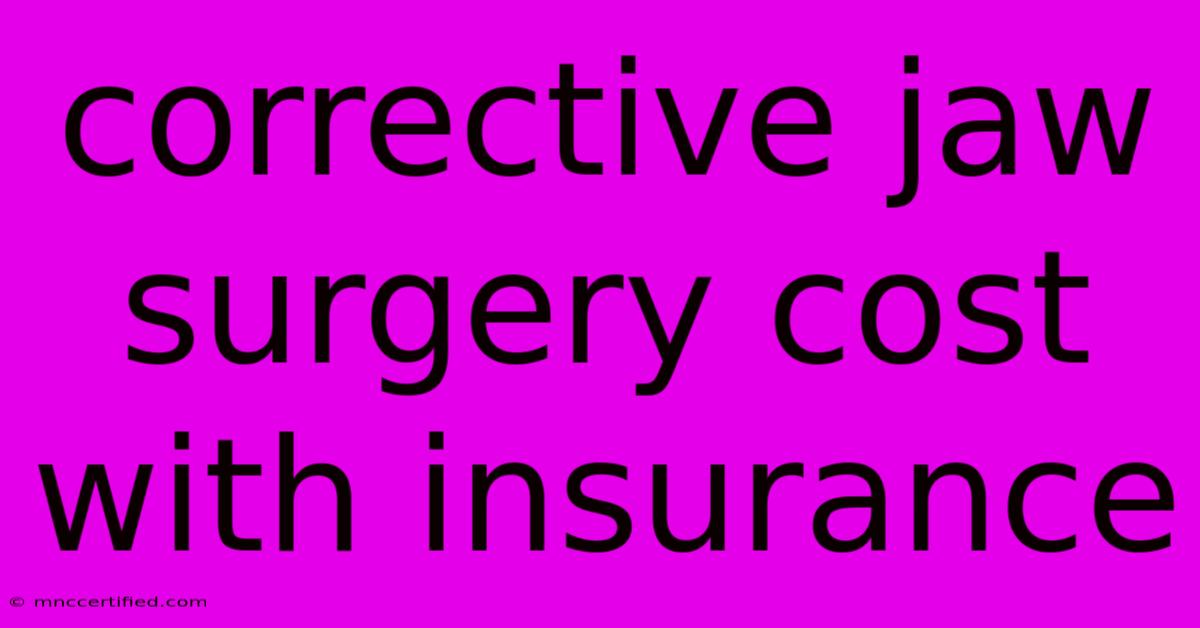Corrective Jaw Surgery Cost With Insurance

Table of Contents
Corrective Jaw Surgery Cost: Understanding Insurance Coverage and Out-of-Pocket Expenses
Corrective jaw surgery, also known as orthognathic surgery, can significantly improve your facial appearance, bite, and overall oral health. However, the cost of this procedure can be substantial, leaving many wondering about insurance coverage and potential out-of-pocket expenses.
This comprehensive guide will help you navigate the financial aspects of corrective jaw surgery, providing insights into:
- What is Corrective Jaw Surgery?
- Factors Affecting Cost
- Insurance Coverage: What to Expect
- Financing Options and Cost-Saving Strategies
- Preparing for Surgery: Financial Considerations
What is Corrective Jaw Surgery?
Corrective jaw surgery addresses issues like:
- Underbite: Lower jaw protrudes beyond the upper jaw.
- Overbite: Upper jaw protrudes over the lower jaw.
- Crossbite: Teeth don't align properly, causing biting issues.
- Open bite: Teeth don't meet when closing the mouth.
- Asymmetry: Facial imbalance due to jaw misalignment.
This complex procedure involves repositioning the jawbones, improving facial symmetry, bite alignment, and overall dental function.
Factors Affecting Corrective Jaw Surgery Cost
The cost of corrective jaw surgery varies significantly based on:
- Complexity of the procedure: Simple procedures like repositioning one jaw are generally less expensive than complex surgeries involving multiple bone adjustments.
- Surgeon's experience and location: Highly specialized surgeons often charge higher fees, and costs may vary depending on the geographic location.
- Anesthesia: The type of anesthesia used (general or local) affects the overall cost.
- Hospital fees: Costs include operating room, recovery room, and post-operative care.
- Additional procedures: If other dental work is required (e.g., braces, teeth extractions), these costs will be added.
Insurance Coverage: What to Expect
While insurance coverage for corrective jaw surgery can vary, it's essential to understand the following:
- Medical necessity: Most insurance plans only cover the procedure if it's deemed medically necessary to address significant functional problems like breathing difficulties or severe jaw misalignment.
- Cosmetic procedures: Cosmetic enhancements purely for aesthetic purposes are rarely covered by insurance.
- Pre-authorization: You'll likely need pre-authorization from your insurance provider before surgery, allowing them to review the medical necessity and determine coverage.
- Copays and deductibles: Even with coverage, you may need to pay copays or deductibles, depending on your specific insurance plan.
- Out-of-network providers: Choosing a surgeon outside your insurance network may lead to higher out-of-pocket costs.
Financing Options and Cost-Saving Strategies
If your insurance doesn't cover the entire cost, consider these options:
- Health Savings Accounts (HSAs): Tax-advantaged accounts for healthcare expenses.
- Flexible Spending Accounts (FSAs): Tax-free accounts for healthcare and dependent care expenses.
- Medical loans: Specialized financing options for medical procedures.
- Payment plans: Some surgeons offer payment plans to help spread the cost.
- Second opinions: Get quotes from multiple surgeons to compare costs and explore different treatment options.
Preparing for Surgery: Financial Considerations
Before undergoing corrective jaw surgery, take these financial steps:
- Contact your insurance provider: Discuss your coverage, pre-authorization process, and potential out-of-pocket costs.
- Explore financing options: Research available financing options and understand the terms and conditions.
- Create a budget: Factor in the estimated cost of the surgery, anesthesia, hospital fees, and potential post-operative expenses.
- Save for potential unexpected costs: Set aside funds for any unforeseen expenses that may arise during or after surgery.
Key Takeaways:
- Understanding your insurance coverage and out-of-pocket expenses is crucial before undergoing corrective jaw surgery.
- Insurance coverage is often limited to medically necessary procedures.
- Explore financing options and cost-saving strategies to make the procedure more affordable.
- Prepare a budget and save for potential unexpected costs.
Remember: Seeking professional advice from your dentist, surgeon, and insurance provider is essential for a smooth and financially responsible journey towards a healthier smile.

Thank you for visiting our website wich cover about Corrective Jaw Surgery Cost With Insurance. We hope the information provided has been useful to you. Feel free to contact us if you have any questions or need further assistance. See you next time and dont miss to bookmark.
Featured Posts
-
Bitcoin After Trump Win Potential Rise Explained
Nov 07, 2024
-
Wisconsin Voters Ban Affirmative Action
Nov 07, 2024
-
Elon Musk Trumps Influence On His Ventures
Nov 07, 2024
-
Does Car Insurance Cover Hitting A Mailbox
Nov 07, 2024
-
Tim Walz Back In Minnesota After Election Defeat
Nov 07, 2024